https://www.theguardian.com/world/2018/sep/27/trump-north-korea-no-rush-denuclearise
'All the time in the world': Trump says no rush for North Korea to denuclearise
Relaxed tone marks change from claims that earlier summit with Kim Jong-un would lead to rapid disarmament
Julian Borger in New York
Thu 27 Sep 2018 01.40 BST Last modified on Thu 27 Sep 2018 01.42 BST
This article is over 4 months old
Shares
174
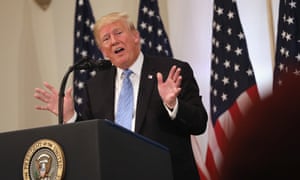
Donald Trump said he has a great relationship with North Korea’s Kim Jong-un. Photograph: John Moore/Getty Images
Donald Trump has said he is in no rush for North Korea to dismantle its nuclear arsenal, noting that missile testing had stopped while sanctions on Pyongyang had not been relaxed.
“I’ve got all the time in the world,” Trump said, at a freewheeling press conference after his appearance at the UN general assembly.
His relaxed tone marked a stark change from the president’s claims after his summit with the North Korean leader, Kim Jong-un in Singapore in June, which Trump said would lead to rapid disarmament.
It also marks a contrast with a claim a week ago by the secretary of state, Mike Pompeo who said that negotiations would lead to the “rapid denuclearisation of North Korea, to be completed by January 2021.”
In his remarks on Wednesday, Trump suggested he had rebuked Pompeo for talking about a deadline.
“I told Mike Pompeo, I said: Mike don’t get into the time frame,” the president said. “I think we are really going to do something that is very important, but we are not playing the time game. If takes two years three years, or five months. It doesn’t matter. There is no nuclear testing and there is no testing of rockets.”
The state department announced on Wednesday that Pompeo would be traveling to Pyongyang at Kim’s invitation next month, to continue negotiations on the “final, fully verified denuclearisation” of North Korea.
Trump pointed to the current freeze in North Korean testing as a significant achievement that had cost the US nothing as the international sanctions had not be lifted.
He also underlined his good relationship with Kim.
“He wants to make a deal. I want to make a deal,” Trump said in course of a rambling press conference. “He likes me. I like him. He wrote me two of the most beautiful letters. ..It is historical. It is a beautiful piece of art.”
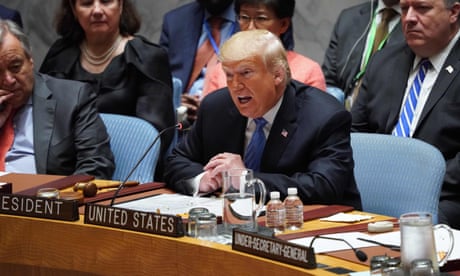
Trump accuses China of meddling in midterms, citing Iowa newspaper ad
Read more
Trump also claimed, without evidence, that Barack Obama had been on the point of going to war with North Korea in the last weeks of his presidency and that Trump’s election had saved the world from calamity.
“If I wasn’t elected you were going to have a war. He was ready to go to war. You would have had a war and you would have lost millions, not thousands,” Trump said. “You know how close he was to pressing the trigger to war?”
Obama reportedly warned Trump during the presidential transition that North Korea represented a serious threat, but the crisis worsened in the first year of the Trump administration, as Pyongyang carried out tests of an apparent thermonuclear bomb and an intercontinental ballistic missile. At last year’s UN general assembly, Trump threatened to “totally destroy” North Korea.
Mintaro Oba, a former state department official said Trump’s relaxed attitude was better than artificial deadlines.
“As crazy as this press conference is, I do much prefer that we not declare a deadline for North Korean denuclearisation,” Oba said in a tweet. “Saying we’ll get it done by 2021 was not a realistic or helpful thing to say.”
https://www.voacambodia.com/a/is-trump-on-path-to-strategic-patience-on-north-korea-/4703795.html
Southeast Asia
Is Trump on Path to ‘Strategic Patience’ on North Korea?
17 December 2018
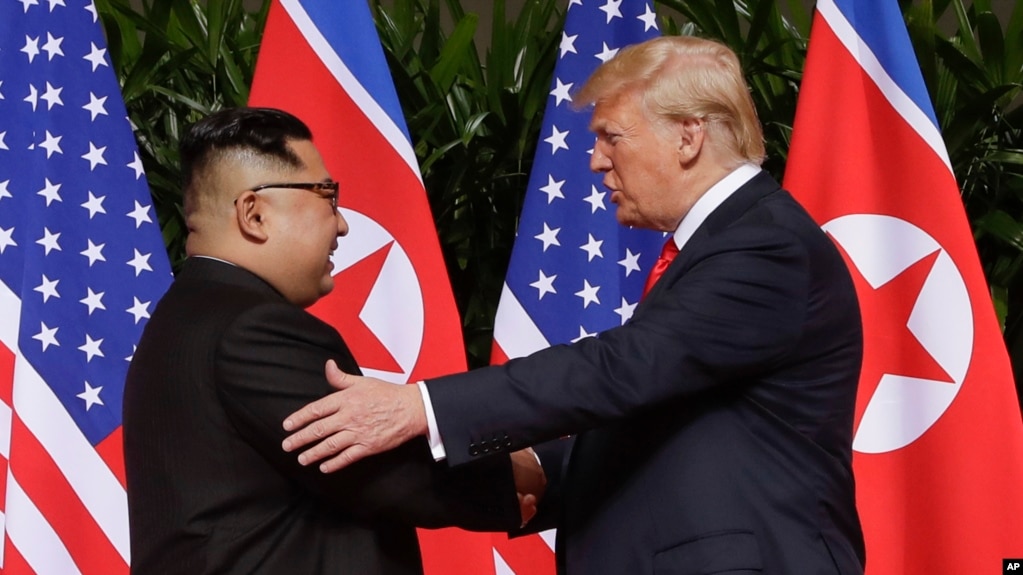
FILE - U.S. President Donald Trump shakes hands with North Korea leader Kim Jong Un at the Capella resort on Sentosa Island, June 12, 2018, in Singapore.
Share
WASHINGTON —
President Donald Trump could find himself embracing “strategic patience” on North Korea, an Obama administration approach he once denounced, as nuclear talks with Pyongyang have stalled, analysts say.
A Trump tweet Friday showed the president’s evolving position.
And this policy pivot follows growing concern in Washington that denuclearization of North Korea is likely to be more complicated and take longer than the Trump White House expected. Washington’s talks with Pyongyang have been stalled, and North Korea has not taken concrete steps toward denuclearization.
North Korea abruptly canceled a scheduled meeting with U.S. Secretary of State Mike Pompeo in early November, and U.S. Special Representative for North Korea Stephen Biegun, appointed in August, has yet to meet with his North Korean counterpart.
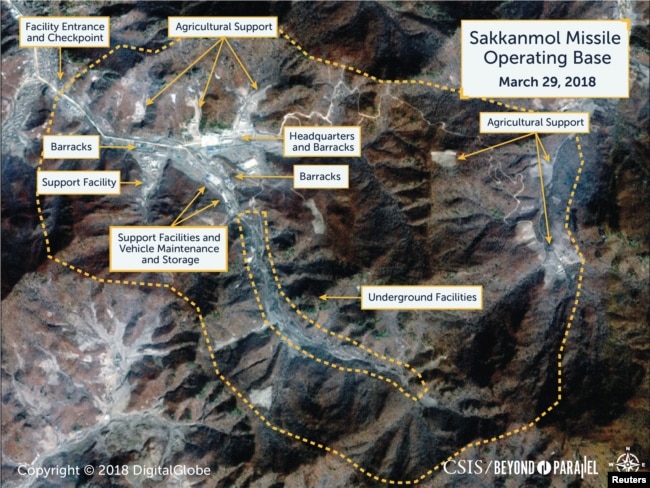
A Digital Globe satellite image taken March 29, 2018, shows what CSIS' Beyond Parallel project reports is an undeclared missile operating base at Sakkanmol, North Korea, and provided to Reuters, Nov. 12, 2018.
Satellite images of North Korea throughout the year showed that the country has not stopped its nuclear and missile programs. The most recent image obtained by CNN last week indicated North Korea might be expanding its key long-range missile base with a newly constructed facility.
Not willing to denuclearize
Former U.S. officials and analysts are concerned North Korea’s unwillingness to denuclearize despite the historic summit between the U.S. and North Korea will lead the Trump administration to adopt “strategic patience” as a default policy choice.
Former President Barak Obama adopted the policy of gradually escalating sanctions on North Korea while refusing to negotiate with Pyongyang until it gave up its nuclear weapons program in what came to be known as “strategic patience.”
Trump said “the era of strategic patience is over” last year when dealing with North Korea and took on the policy of “maximum pressure” while engaged in diplomatic talks with Pyongyang this year.
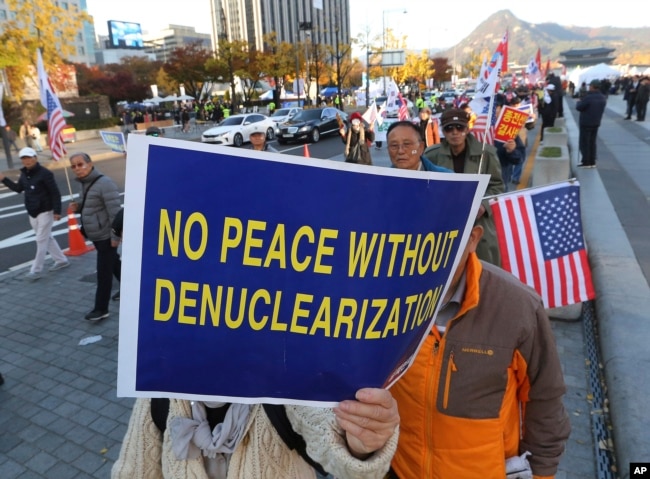
Protesters march toward the U.S. Embassy during a rally supporting the United States' policy to put steady pressure on North Korea in Seoul, South Korea, Nov. 3, 2018.
Not a policy, ‘it is a fact of life’
Gary Samore, the White House coordinator for arms control and weapons of mass destruction during the Obama administration, said strategic patience is a result of a policy rather a policy itself.
“For me, ‘strategic patience’ is not a policy,” Samore said. “It is a fact of life.”
According to Samore, the Trump administration is following the same policies of “economic pressure and promises to induce North Korea to accept denuclearization” as the Obama administration had done, with the exception of meeting Kim.
“The biggest difference between Trump and Obama is President Trump’s decision to meet directly with Kim Jong Un to start the negotiation process, the so-called ‘top-down’ approach,” Samore said.
The results are the same
Ken Gause, director of the International Affairs Group, said, “As long as Trump continues down the path of maximum pressure and denuclearization first, he is essentially following the path of strategic patience.”
He continued, “It might not look like strategic patience because of the U.S.-North Korean talks … but the results are the same.”
Gause said the U.S. will drift toward “strategic patience” as long as North Korea’s demand for economic concessions remains unmet.
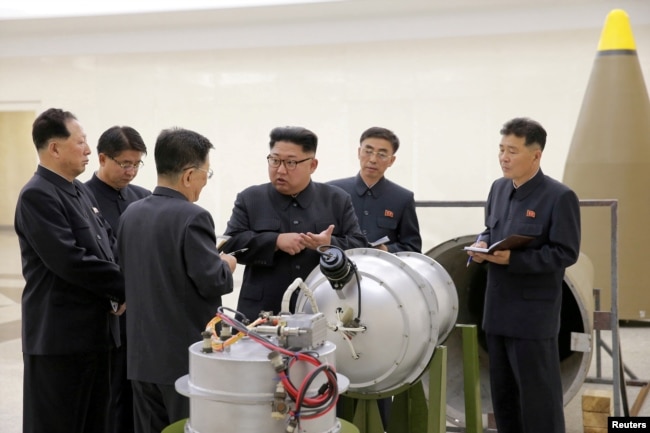
FILE - North Korean leader Kim Jong Un provides guidance on a nuclear weapons program in this undated photo released by North Korea's Korean Central News Agency in Pyongyang, Sept. 3, 2017.
Less patience, more strategy
Evans Revere, acting assistant secretary at the State Department’s Bureau of East Asian and Pacific Affairs during the George W. Bush administration, said he sees “too much patience and very little strategy in the administration’s approach.”
“Despite clear evidence that [North Korea] is expanding its nuclear and missile capabilities, President Trump has removed the timeline for the North’s denuclearization,” he said.
Revere added, “It’s time for more strategy, less patience, coupled with a healthy dose of action.”
Second summit?
However, Scott Snyder, director of the Program on U.S. Korean Policy at the Council of Foreign Policy, said Trump’s approach toward North Korea differs from the approach that the Obama administration took.
“The Trump administration’s approach involves conscious application of increasing pressure toward North Korea designed to drive toward a decisive point, rather than waiting more passively for North Korea to make a decision,” Snyder said.
Trump has said he is willing to meet Kim for a second summit as early as January or February of next year. Pyongyang, however, has not accepted the summit offer, at least publicly.
On Thursday, North Korea blamed Washington for stalled denuclearization talks, while saying it remains open to discussion and progress.
North Korea’s state-run Korean Central News Agency (KCNA) said, “How can a negotiation train move when North Korea is the only one moving and the U.S. is standing still.” It continued, “We are waiting with patience” for the U.S. to take corresponding measures.
https://www.channelnewsasia.com/new...orth-korea-strategy-denuclearisation-10865986
Commentary: Trump’s floundering North Korea strategy
There has been no progress towards denuclearisation, says one observer.
Trump used his debut address 12 months ago to threaten to "totally destroy" North Korea and belittled its leader as "rocket man," prompting Kim to respond by calling the US president "mentally deranged" (Photo: AFP/TIMOTHY A. CLARY)

By Christopher R. Hill
28 Oct 2018 02:57PM (Updated: 28 Oct 2018 03:00PM)
Share this content
Bookmark
DENVER: “Insanity is doing the same thing over and over again and expecting different results.”
This aphorism, often attributed to Albert Einstein, seems to be the inspiration for US President Donald Trump’s North Korea policy.
Trump’s approach has been to reject everything that came before him, while involving himself in negotiations to an unprecedented degree. As a result, the US Secretary of State has been reduced to little more than a sherpa for his boss’s summits with North Korean leader Kim Jong Un.
The question, though, is whether Trump’s unique approach is actually yielding any results. As of now, there has been nothing to suggest that North Korea is changing its ways. But with another Trump-Kim summit expected some time in the next few months, we might soon have more clarity on the matter.
READ: Do we really need a second Trump-Kim summit? A commentary
NUCLEAR NEGOTIATIONS
Trump claims to have mastered the art of nuclear negotiation – if not the details, then at least its fundamental essence.
In March, he interrupted a meeting between his then-National Security Adviser H R McMaster and a South Korean delegation to reveal, out of the blue, that he would gladly meet with Kim. He has since followed his own star, always asserting that great progress is being made. After his first summit with Kim in June, he declared that, “There is no longer a nuclear threat from North Korea.”
In fact, there has been no progress towards denuclearisation.
In mid-December 2017, Kim announced that his country had completed its missile-test programme, having proven that the latest Hwasong intercontinental missiles are ready for deployment.
READ: Second time’s a charm? The US must give up something or next Trump-Kim summit will be the last, a commentary
File photo released on Feb 9, 2018, by North Korea's official Korean Central News Agency (KCNA) shows Hwasong-15 ballistic missiles. (Photo: KCNA VIA KNS/AFP)
He also claimed to have developed a nuclear warhead capable of surviving the terminal phase of a missile launch, though experts note that there is still no evidence for this.
By making these announcements, Kim may have been suggesting that he was ready to pursue his goal of ending the Trump administration’s “maximum pressure” sanctions regime through non-military means.
But he also might have intended his statements to be taken at face value, simply to let the world know that North Korea had developed both nuclear weapons and the means to deliver them.
Despite these different possible interpretations, the Trump administration seized on Kim’s statements as a sure sign that North Korea is ready to disarm. And this leap of logic seemed to gain more credence at the summit in June, where Kim “reaffirmed his firm and unwavering commitment to complete denuclearisation of the Korean peninsula.”
But, of course, all the US really got from the summit was a vaguely worded joint statement. The North Koreans, by contrast, made real progress toward their own goal of weakening the US presence in Northeast Asia.
Most notably, Trump suddenly seemed to endorse the withdrawal of US troops from the Korean Peninsula, and he has since cancelled US military exercises with South Korea.
Meanwhile, the North Koreans have engaged in random acts of “denuclearisation” by closing nuclear test sites that the US hasn’t actually asked them to close. While these acts of decommissioning make for good imagery, they are not a part of any organised effort to identify and dismantle core elements of the country’s nuclear programme.
READ: What will it cost to denuclearise North Korea?
North Korea has repeatedly expressed a commitment to the "denuclearisation of the Korean peninsula" but the term is open to interpretation on both sides (Photo: AFP/STR)
At the same time, the North Koreans continue to insist that their nuclear arsenal is a defensive response to “hostile” US policies. The implication is that if the US removes its troops from the Korean Peninsula, some degree of denuclearisation could follow.
SOUTH KOREA AS BROKER
Complicating matters further, South Korean President Moon Jae-in’s administration has embraced the view that strong incentives and deeper integration are more effective than sanctions for bringing about denuclearisation.
Thus, in its ongoing parallel talks with the North, it has essentially decoupled inter-Korean diplomacy from the nuclear issue.
Still, South Korea has also continued to act as a broker between the US and the Kim regime.
Whenever the US-North Korean talks have hit a snag, Moon has stepped in to revive them, often by throwing bouquets to both Kim and Trump as encouragement to continue.
But while the US and South Korea have remained in close contact, North Korea has most likely been trying to create tensions between the two allies by telling them each slightly different things.
For its part, the Trump administration has done a good job of maintaining the US alliance with South Korea. To this day, many Koreans blame the US and other outside forces for Korea’s tragic division, and the Trump administration has been careful not to criticise Moon’s inter-Korean dialogue publicly.
That said, it is clear that the inter-Korean talks are making it increasingly difficult to apply pressure on the North, especially now that South Korea has begun to explore the possibility of sanctions relief.
READ: Denuclearising North Korea won't make it a normal country, a commentary
Kim Jong Un and Moon Jae-in's latest summit has breathed new momentum into denuclearisation talks. (Photo: AFP)
WORKING AGAINST CHINA
The last major player is China, which doesn’t seem to know what to make of the North Korean denuclearisation process.
China’s decision to punish South Korea for hosting a US missile-defence system greatly diminished its standing among the South Korean public and undermined its ability to influence South Korean policies. But in the months leading up to the Trump-Kim summit in Singapore, China hosted Kim twice, and again immediately afterward, effectively reasserting its influence over the North.
In keeping with his effort to break from his predecessors in every way, Trump seems to believe that it is easier to work against China than to work with it. That proposition is sure to be tested in the weeks and months ahead.
Christopher R Hill, former US Assistant Secretary of State for East Asia, is chief advisor to the Chancellor for Global Engagement, Professor of the Practice in Diplomacy at the University of Denver, and the author of Outpost.
Source: Project Syndicate/nr(sl)
'All the time in the world': Trump says no rush for North Korea to denuclearise
Relaxed tone marks change from claims that earlier summit with Kim Jong-un would lead to rapid disarmament
Julian Borger in New York
Thu 27 Sep 2018 01.40 BST Last modified on Thu 27 Sep 2018 01.42 BST
This article is over 4 months old
Shares
174

Donald Trump said he has a great relationship with North Korea’s Kim Jong-un. Photograph: John Moore/Getty Images
Donald Trump has said he is in no rush for North Korea to dismantle its nuclear arsenal, noting that missile testing had stopped while sanctions on Pyongyang had not been relaxed.
“I’ve got all the time in the world,” Trump said, at a freewheeling press conference after his appearance at the UN general assembly.
His relaxed tone marked a stark change from the president’s claims after his summit with the North Korean leader, Kim Jong-un in Singapore in June, which Trump said would lead to rapid disarmament.
It also marks a contrast with a claim a week ago by the secretary of state, Mike Pompeo who said that negotiations would lead to the “rapid denuclearisation of North Korea, to be completed by January 2021.”
In his remarks on Wednesday, Trump suggested he had rebuked Pompeo for talking about a deadline.
“I told Mike Pompeo, I said: Mike don’t get into the time frame,” the president said. “I think we are really going to do something that is very important, but we are not playing the time game. If takes two years three years, or five months. It doesn’t matter. There is no nuclear testing and there is no testing of rockets.”
He likes me. I like him. He wrote me two of the most beautiful letters.
Donald Trump on Kim Jong-un
Donald Trump on Kim Jong-un
The state department announced on Wednesday that Pompeo would be traveling to Pyongyang at Kim’s invitation next month, to continue negotiations on the “final, fully verified denuclearisation” of North Korea.
Trump pointed to the current freeze in North Korean testing as a significant achievement that had cost the US nothing as the international sanctions had not be lifted.
He also underlined his good relationship with Kim.
“He wants to make a deal. I want to make a deal,” Trump said in course of a rambling press conference. “He likes me. I like him. He wrote me two of the most beautiful letters. ..It is historical. It is a beautiful piece of art.”

Trump accuses China of meddling in midterms, citing Iowa newspaper ad
Read more
Trump also claimed, without evidence, that Barack Obama had been on the point of going to war with North Korea in the last weeks of his presidency and that Trump’s election had saved the world from calamity.
“If I wasn’t elected you were going to have a war. He was ready to go to war. You would have had a war and you would have lost millions, not thousands,” Trump said. “You know how close he was to pressing the trigger to war?”
Obama reportedly warned Trump during the presidential transition that North Korea represented a serious threat, but the crisis worsened in the first year of the Trump administration, as Pyongyang carried out tests of an apparent thermonuclear bomb and an intercontinental ballistic missile. At last year’s UN general assembly, Trump threatened to “totally destroy” North Korea.
Mintaro Oba, a former state department official said Trump’s relaxed attitude was better than artificial deadlines.
“As crazy as this press conference is, I do much prefer that we not declare a deadline for North Korean denuclearisation,” Oba said in a tweet. “Saying we’ll get it done by 2021 was not a realistic or helpful thing to say.”
https://www.voacambodia.com/a/is-trump-on-path-to-strategic-patience-on-north-korea-/4703795.html
Southeast Asia
Is Trump on Path to ‘Strategic Patience’ on North Korea?
17 December 2018
- Christy Lee
- VOA News

FILE - U.S. President Donald Trump shakes hands with North Korea leader Kim Jong Un at the Capella resort on Sentosa Island, June 12, 2018, in Singapore.
Share
WASHINGTON —
President Donald Trump could find himself embracing “strategic patience” on North Korea, an Obama administration approach he once denounced, as nuclear talks with Pyongyang have stalled, analysts say.
A Trump tweet Friday showed the president’s evolving position.
And this policy pivot follows growing concern in Washington that denuclearization of North Korea is likely to be more complicated and take longer than the Trump White House expected. Washington’s talks with Pyongyang have been stalled, and North Korea has not taken concrete steps toward denuclearization.
North Korea abruptly canceled a scheduled meeting with U.S. Secretary of State Mike Pompeo in early November, and U.S. Special Representative for North Korea Stephen Biegun, appointed in August, has yet to meet with his North Korean counterpart.

A Digital Globe satellite image taken March 29, 2018, shows what CSIS' Beyond Parallel project reports is an undeclared missile operating base at Sakkanmol, North Korea, and provided to Reuters, Nov. 12, 2018.
Satellite images of North Korea throughout the year showed that the country has not stopped its nuclear and missile programs. The most recent image obtained by CNN last week indicated North Korea might be expanding its key long-range missile base with a newly constructed facility.
Not willing to denuclearize
Former U.S. officials and analysts are concerned North Korea’s unwillingness to denuclearize despite the historic summit between the U.S. and North Korea will lead the Trump administration to adopt “strategic patience” as a default policy choice.
Former President Barak Obama adopted the policy of gradually escalating sanctions on North Korea while refusing to negotiate with Pyongyang until it gave up its nuclear weapons program in what came to be known as “strategic patience.”
Trump said “the era of strategic patience is over” last year when dealing with North Korea and took on the policy of “maximum pressure” while engaged in diplomatic talks with Pyongyang this year.

Protesters march toward the U.S. Embassy during a rally supporting the United States' policy to put steady pressure on North Korea in Seoul, South Korea, Nov. 3, 2018.
Not a policy, ‘it is a fact of life’
Gary Samore, the White House coordinator for arms control and weapons of mass destruction during the Obama administration, said strategic patience is a result of a policy rather a policy itself.
“For me, ‘strategic patience’ is not a policy,” Samore said. “It is a fact of life.”
According to Samore, the Trump administration is following the same policies of “economic pressure and promises to induce North Korea to accept denuclearization” as the Obama administration had done, with the exception of meeting Kim.
“The biggest difference between Trump and Obama is President Trump’s decision to meet directly with Kim Jong Un to start the negotiation process, the so-called ‘top-down’ approach,” Samore said.
The results are the same
Ken Gause, director of the International Affairs Group, said, “As long as Trump continues down the path of maximum pressure and denuclearization first, he is essentially following the path of strategic patience.”
He continued, “It might not look like strategic patience because of the U.S.-North Korean talks … but the results are the same.”
Gause said the U.S. will drift toward “strategic patience” as long as North Korea’s demand for economic concessions remains unmet.

FILE - North Korean leader Kim Jong Un provides guidance on a nuclear weapons program in this undated photo released by North Korea's Korean Central News Agency in Pyongyang, Sept. 3, 2017.
Less patience, more strategy
Evans Revere, acting assistant secretary at the State Department’s Bureau of East Asian and Pacific Affairs during the George W. Bush administration, said he sees “too much patience and very little strategy in the administration’s approach.”
“Despite clear evidence that [North Korea] is expanding its nuclear and missile capabilities, President Trump has removed the timeline for the North’s denuclearization,” he said.
Revere added, “It’s time for more strategy, less patience, coupled with a healthy dose of action.”
Second summit?
However, Scott Snyder, director of the Program on U.S. Korean Policy at the Council of Foreign Policy, said Trump’s approach toward North Korea differs from the approach that the Obama administration took.
“The Trump administration’s approach involves conscious application of increasing pressure toward North Korea designed to drive toward a decisive point, rather than waiting more passively for North Korea to make a decision,” Snyder said.
Trump has said he is willing to meet Kim for a second summit as early as January or February of next year. Pyongyang, however, has not accepted the summit offer, at least publicly.
On Thursday, North Korea blamed Washington for stalled denuclearization talks, while saying it remains open to discussion and progress.
North Korea’s state-run Korean Central News Agency (KCNA) said, “How can a negotiation train move when North Korea is the only one moving and the U.S. is standing still.” It continued, “We are waiting with patience” for the U.S. to take corresponding measures.
https://www.channelnewsasia.com/new...orth-korea-strategy-denuclearisation-10865986
Commentary: Trump’s floundering North Korea strategy
There has been no progress towards denuclearisation, says one observer.
Trump used his debut address 12 months ago to threaten to "totally destroy" North Korea and belittled its leader as "rocket man," prompting Kim to respond by calling the US president "mentally deranged" (Photo: AFP/TIMOTHY A. CLARY)

By Christopher R. Hill
28 Oct 2018 02:57PM (Updated: 28 Oct 2018 03:00PM)
Share this content
Bookmark
DENVER: “Insanity is doing the same thing over and over again and expecting different results.”
This aphorism, often attributed to Albert Einstein, seems to be the inspiration for US President Donald Trump’s North Korea policy.
Trump’s approach has been to reject everything that came before him, while involving himself in negotiations to an unprecedented degree. As a result, the US Secretary of State has been reduced to little more than a sherpa for his boss’s summits with North Korean leader Kim Jong Un.
The question, though, is whether Trump’s unique approach is actually yielding any results. As of now, there has been nothing to suggest that North Korea is changing its ways. But with another Trump-Kim summit expected some time in the next few months, we might soon have more clarity on the matter.
READ: Do we really need a second Trump-Kim summit? A commentary
NUCLEAR NEGOTIATIONS
Trump claims to have mastered the art of nuclear negotiation – if not the details, then at least its fundamental essence.
In March, he interrupted a meeting between his then-National Security Adviser H R McMaster and a South Korean delegation to reveal, out of the blue, that he would gladly meet with Kim. He has since followed his own star, always asserting that great progress is being made. After his first summit with Kim in June, he declared that, “There is no longer a nuclear threat from North Korea.”
In fact, there has been no progress towards denuclearisation.
In mid-December 2017, Kim announced that his country had completed its missile-test programme, having proven that the latest Hwasong intercontinental missiles are ready for deployment.
READ: Second time’s a charm? The US must give up something or next Trump-Kim summit will be the last, a commentary
File photo released on Feb 9, 2018, by North Korea's official Korean Central News Agency (KCNA) shows Hwasong-15 ballistic missiles. (Photo: KCNA VIA KNS/AFP)
He also claimed to have developed a nuclear warhead capable of surviving the terminal phase of a missile launch, though experts note that there is still no evidence for this.
By making these announcements, Kim may have been suggesting that he was ready to pursue his goal of ending the Trump administration’s “maximum pressure” sanctions regime through non-military means.
But he also might have intended his statements to be taken at face value, simply to let the world know that North Korea had developed both nuclear weapons and the means to deliver them.
Despite these different possible interpretations, the Trump administration seized on Kim’s statements as a sure sign that North Korea is ready to disarm. And this leap of logic seemed to gain more credence at the summit in June, where Kim “reaffirmed his firm and unwavering commitment to complete denuclearisation of the Korean peninsula.”
But, of course, all the US really got from the summit was a vaguely worded joint statement. The North Koreans, by contrast, made real progress toward their own goal of weakening the US presence in Northeast Asia.
Most notably, Trump suddenly seemed to endorse the withdrawal of US troops from the Korean Peninsula, and he has since cancelled US military exercises with South Korea.
Meanwhile, the North Koreans have engaged in random acts of “denuclearisation” by closing nuclear test sites that the US hasn’t actually asked them to close. While these acts of decommissioning make for good imagery, they are not a part of any organised effort to identify and dismantle core elements of the country’s nuclear programme.
READ: What will it cost to denuclearise North Korea?
North Korea has repeatedly expressed a commitment to the "denuclearisation of the Korean peninsula" but the term is open to interpretation on both sides (Photo: AFP/STR)
At the same time, the North Koreans continue to insist that their nuclear arsenal is a defensive response to “hostile” US policies. The implication is that if the US removes its troops from the Korean Peninsula, some degree of denuclearisation could follow.
SOUTH KOREA AS BROKER
Complicating matters further, South Korean President Moon Jae-in’s administration has embraced the view that strong incentives and deeper integration are more effective than sanctions for bringing about denuclearisation.
Thus, in its ongoing parallel talks with the North, it has essentially decoupled inter-Korean diplomacy from the nuclear issue.
Still, South Korea has also continued to act as a broker between the US and the Kim regime.
Whenever the US-North Korean talks have hit a snag, Moon has stepped in to revive them, often by throwing bouquets to both Kim and Trump as encouragement to continue.
But while the US and South Korea have remained in close contact, North Korea has most likely been trying to create tensions between the two allies by telling them each slightly different things.
For its part, the Trump administration has done a good job of maintaining the US alliance with South Korea. To this day, many Koreans blame the US and other outside forces for Korea’s tragic division, and the Trump administration has been careful not to criticise Moon’s inter-Korean dialogue publicly.
That said, it is clear that the inter-Korean talks are making it increasingly difficult to apply pressure on the North, especially now that South Korea has begun to explore the possibility of sanctions relief.
READ: Denuclearising North Korea won't make it a normal country, a commentary
Kim Jong Un and Moon Jae-in's latest summit has breathed new momentum into denuclearisation talks. (Photo: AFP)
WORKING AGAINST CHINA
The last major player is China, which doesn’t seem to know what to make of the North Korean denuclearisation process.
China’s decision to punish South Korea for hosting a US missile-defence system greatly diminished its standing among the South Korean public and undermined its ability to influence South Korean policies. But in the months leading up to the Trump-Kim summit in Singapore, China hosted Kim twice, and again immediately afterward, effectively reasserting its influence over the North.
In keeping with his effort to break from his predecessors in every way, Trump seems to believe that it is easier to work against China than to work with it. That proposition is sure to be tested in the weeks and months ahead.
Christopher R Hill, former US Assistant Secretary of State for East Asia, is chief advisor to the Chancellor for Global Engagement, Professor of the Practice in Diplomacy at the University of Denver, and the author of Outpost.
Source: Project Syndicate/nr(sl)
